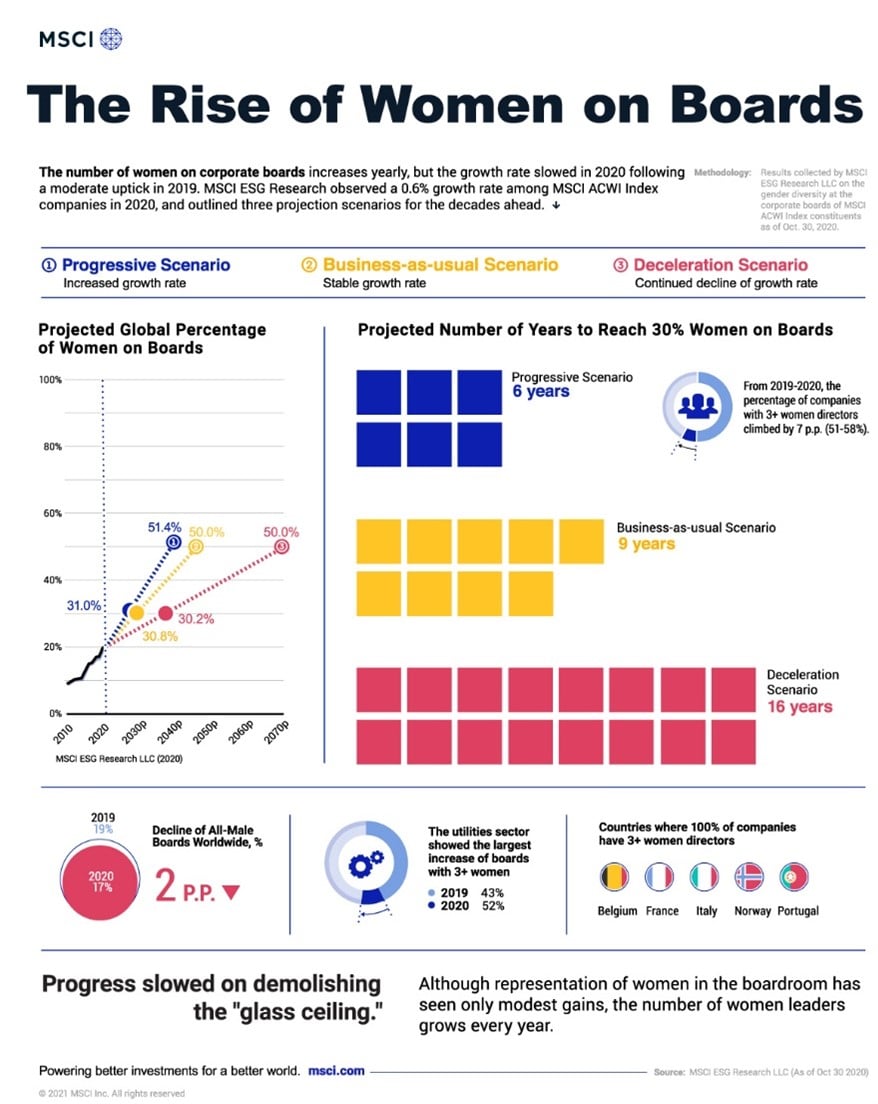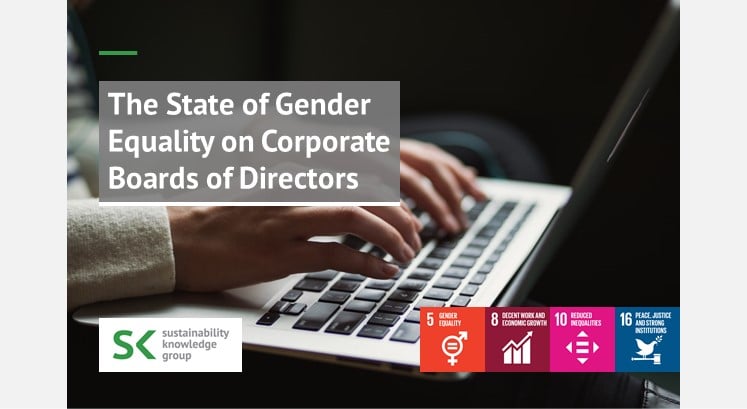Gender equality is one of the United Nations’ seventeen goals for sustainable development (SDG 5: Gender Equality). Women represent 39% of the global workforce, yet in May 2020, women accounted for 54% of job losses.
Gender parity at work and increased representation of women on corporate boards is critical to economic growth and societal cohesion. Much attention has been paid to the number of women at the board level, and to a lesser extent, executive positions. During recent years, the number of women on boards of directors has increased worldwide, but the growth rate slowed in 2020 by 0.6%. Although women directors’ growth rate has slowed in 2020, all-male boards have declined worldwide to 17%.
MSCI ESG Research has revealed three future scenarios to increase women’s representation on corporate boards of directors by 30%. According to the figure below, in a “Business-as-usual” scenario, it would take women 9 years to reach 30% representation in the boards. In general, corporate board parity can be reached by 2039 or even as late as 2070.

The number of women CEO remains low in all regions, but CFO roles look more promising. Currently, there is greater representation of women in CFO roles due to emerging market companies.
Stock exchanges play an important role in promoting gender equality in their markets. On average, women hold 20.2% of board seats in the 100 largest companies on the significant G20 stock exchanges. Women also hold 5.5% of Chair and CEO positions in companies listed on G20 stock exchanges.
Global Gender Gap Report 2021
The World Economic Forum measures gender gaps in the annual Global Gender Gap Report. The report tracks progress in closing gender gaps, providing a tool for comparison across countries, and prioritizing the most effective policies needed to close gender gaps.
The Global Gender Gap Report 2021 showed that globally, the average distance completed to parity is at 68%, a step back compared to 2020 (-0.6 percentage points). According to the report, there is still a persistent lack of women in leadership positions, with women representing only 27% of all manager positions.
Boards of directors worldwide
Some countries have taken steps to encourage or enforce improved gender diversity on corporate boards. Europe still has the highest representation of women on boards of directors, with women accounting for 45% of the European workforce and most university graduates. All top 10 countries with three or more women directors are found in Europe. In Iceland, women are most prominent in senior or managerial positions, representing 45.9% of board members.
In 2012, the European Commission submitted a proposal for a directive on gender balance among non-executive directors of companies listed on stock exchanges. The directive aims to have at least 40% of women as non-executive directors on the lists. However, the proposal failed to garner the support of a qualified majority of member states and has been stuck in the council since 2012. On January 21, 2021, Parliament passed a resolution calling for continued work with the Member States to quickly break the deadlock in the Council and adopt the proposed Directive.
In Germany, the “Act on Equal Participation of Women and Men in Executive Positions in the Private and the Public Sector” has been adopted. The Act provides for a mandatory gender quota of at least 30% for German companies’ supervisory boards, which are listed on the public stock exchange and subject to a parity determination.
In the USA, some states such as California require gender diversity on corporate boards. Publicly traded companies present in the state must now have at least one female board directors – or the company faces a $ 100,000 fine.
In March 2021 and to enhance diversity, it became mandatory for UAE Public Joint-Stock Companies (PJSCs) listed to have at least one female director on their boards. Companies must adhere to the minimum requirements for female representation in the board of directors to avoid any sanctions as soon as possible.
In 2020, Saudi Arabia and the UAE experienced a drop in all-male boards of directors to 86% and 63%, respectively. In Egypt, women working in the workforce are less likely to receive the same pay as their male colleagues for equivalent work or to reach senior management positions.
Breaking the glass ceiling
Diversity needs to be at the top of the corporate agenda and a board priority. Boards of directors need to treat diversity as an imperative and not merely in compliance with procedures or laws. The glass ceiling must be broken, and although it is not visible, it prevents women from well-deserved promotion and recognitions.
A gender-diverse management approach reflects a wide variety of perspectives and provides new approaches to business challenges, contributing to understanding and addressing issues more deeply and making better decisions. When analyzing the performance of companies in different countries as part of the Corporate Sustainability Assessment, countries with gender diversity on the board showed better performance than countries with male-dominated boards. Having more women on the board leads to less excessive risk-taking, improving company reputation, profit quality and sustainability.
Leaders have an unprecedented opportunity to build more resilient economies and gender equality by investing in inclusive workplaces, creating more equitable care systems, promoting women’s rise to leadership positions and integrating gender parity, to shape the future of work. Having more women on the board is essential. Pushing towards this direction, helps break stereotypes of women in leadership, create new, much needed role models, encourages women to pursue promising and fulfilling careers, and ultimately creates better businesses and fairer societies.
Photo by Kaitlyn Baker on Unsplash
___
Sustainability Knowledge Group is a global Sustainability, ESG and CSR advisory firm dedicated in creating value through strategic advisory and training solutions, coaching and meetups. We work with organisations to develop, manage, and measure effective Sustainability strategies and programs, address social and environmental challenges, and bring tangible results, positive impact and create better businesses.
As a CPD Standards and ILM Recognised Provider, Sustainability Knowledge Group offers certified training courses on Sustainability. To join our trainings and gain the skills and knowledge you need to lead in Sustainability, visit: https://sustainabilityknowledgegroup.com/training
Book now for our next certified training: Chief Sustainability Officer (CSO) Professional, on 21/09/2021 – 28/09/2021.

